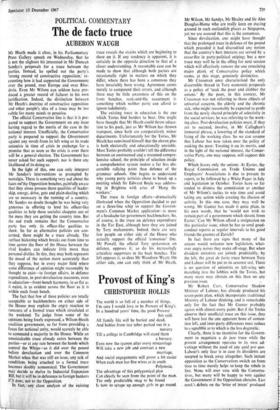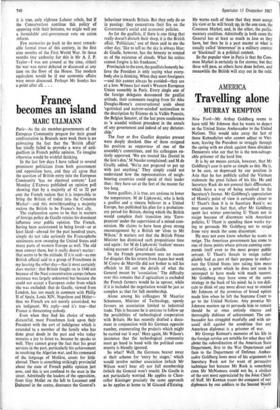The de facto truce
POLITICAL COMMENTARY AUBERON WAUGH
Mr Heath made it clear, in his Parliamentary Press Gallery speech on Wednesday, that he is not the slightest bit interested in Mr Duncan Sandys's proposals for a truce between the parties. Instead, he spelled out the party's 'strong record of constructive opposition,' re- counting how it had supported the Government over the pound, over Europe and over Rho- desia. Even Mr Wilson can seldom have pro- duced a greater record of failures in his own justification. Indeed, the distinction between Mr Heath's doctrine of constructive opposition and other people's idea of a truce may be too subtle for many minds to perceive.
The official Conservative line is that it is pre- pared to support the Government on any issue having regard to the merits of the case in the national interest. Unofficially, the Conservative party • is prepared to support the Government against any revolt from its left wing or its trade unionists in time of crisis in exchange for a promise that as soon as the crisis is over there will be a general election. The Government has never asked for such support, nor is there any likelihood of its doing so.
In the light of this, one can only interpret Mr Sandys's interventions as prompted by nostalgia. There is something very sad about the faces on'the Opposition benches, painfully aware that they alone possess those qualities of leader- ship, energy, drive, guts and plain-dealing which are so necessary in the running of a country. Mr Sandys no doubt thought he was being very generous in offering to lend his officer-like qualities to help these socialist chappies out of the mess they are getting the country into. But the sad truth remains that the Conservative party has only its officer-like qualities to show. So far as alternative policies are con- cerned, there might be a truce already. The surface bickering which breaks out from time to time across the floor of the House between the rival leaders can indicate little more than personal dislike. In this, they may both represent the mood of the nation more accurately than they suppose, but in every major field where some difference of opinion might reasonably be thought to exist—in foreign affairs, in defence expenditure, in post-devaluation measures, 'even in education—front-bench harmony, in so-fir as it exists, is as evident across the floor as it is' within each front bench.
The fact that few of these policies are totally acceptable to backbenchers on either side of the House may explain the angry reaction to rumours of a formal truce which circulated at the weekend. To judge from some of the opinions being freely expressed, a Wilson-Heath coalition government, so far from providing a focus for national unity, would scarcely be able to command a majority in the House. While an unmistakable truce already exists between the parties—or at any rate between the hands which control the Whips—as it did over the pound before devaluation and over the Common Market when that was still an issue, any talk of conditions being attached to a formal truce becomes doubly nonsensical. The Government may decide to shelve its Industrial Expansion Bill, but it will be in deference to foreign bankers int does, not to the Opposition. In fact, any close analysis of the existing truce reveals the strains which are beginning to show on it. If any tendency is apparent, it is certainly in the opposite direction to that of a closer understanding. A reasonable case can be made to show that although both parties are occasionally right in matters on which they differ, where there has been a consensus they have invariably been wrong. Agreement seems merely to compound their errors, and although there may be little awareness of this on the front benches, rank-and-file resentment is something which neither party can afford to ignore indefinitely.
The existing truce in education is the one which Tories find hardest to bear. One might have thought that Mr Heath could throw educa- tion to his pack, just as Mr Wilson has thrown transport, since both are comparatively minor departments. Unfortunately for the Tories, Mr Heath has convinced himself that the eleven plus is both electorally and educationally unviable. Most Tories probably couldn't tell the difference between an unstreamed and a streamed compre- hensive school; the principle of selection inside a comprehensive system makes a far less dis- cernible rallying point than defence of the grammar schools. One begins to understand why young party activists chose to break up a meeting which Sir Edward Boyle was address- ing in Brighton with cries of 'Hang the workers.'
The truce in foreign affairs—dramatically illustrated when the Opposition decided to put on a three-line whip to support the Govern- ment's Common Market application—is more of a headache for government backbenchers. So, of course, is the truce on defence expenditure in the Ear East, although here they are joined by Tory malcontents. Indeed, there are very few people on either side of the House who actually support the official 'consensus' line. Mr Powell, the official Tory spokesman on defence, opposes it; so do his increasingly articulate supporters in the back benches. The left opposes it, so does Mr Woodrow Wyatt. On either side, one can only think of Mr Heath,
Mr Wilson, Mr Sandys, Mr Healey and Sir Alec Douglas-Home who are really keen on staying around in such outlandish plaCes as Singapore, yet we are assured that this is the consensus.
Since devaluation, one might have thought that the prolonged truce in defence of the pound which preceded it had discredited any notion that the country's best interests are served by a cease-fire in party-political sniping; but a new truce may well be in the offing for next session which will effectively remove the one remaining major plank of Conservative policy which seems, at this stage, genuinely distinctive.
Mr Crossman once characterised the only discernible thread in Tory economic proposals as a policy of 'soak the poor and clobber the unions.' By the poor, in this context, Mr Crossman was not referring to those objects of universal concern, the elderly and the chronic sick, who might reasonably be expected to profit from the newly shared principle of selectivity in the social services; he was referring to the work- ing class. Post-devaluation policies must, if they are to succeed, involve, in Mr Callaghan's immortal phrase, a lowering of the standard of living of the working class. So we can assume that Labour has now taken over the policy of soaking the poor. Treating it on its merits, and in the light of the national interest, the Conser- vative Party, one may suppose, will support this policy.
Which leaves only the unions. At Easter, the Royal Commission on Trade Unions' and Employers' Associations is due to present its report, to be followed by a White Paper in July and legislation in October. Tories have so far tended to dismiss the commission as another of Mr Wilson's tactics to win time and avoid taking any action while creating the illusion of activity. In this one case, they may well be wrong. Mr Gunter has made it quite plain. in his own words, that he 'would not wish to remain part of a government which shrank from Easter.' Can Mr Wilson afford a resignation on this particular issue, when he has to send good- conduct reports at regular intervals to his BOW friends the gnomes of Zurich?
In fact there are signs that many of the unions would welcome new legislation, what- ever angry noises they make off-stage. But when dissident unionists are joined. predictably, by the left, the great de facto truce between Tory and Labour will be put to its severest test. There is no question of unionists or left-wing sum marching into the lobbies with the Tories, but many more may abstain on this than on any previous issue.
Mr Robert Carr, Conservative Shadow Minister of Labour, has already produced his seven-point plan, which incorporates traditional Ministry of Labour thinking, and is remarkable only for the fact that Mr Gunter probably agrees with almost every point. But if the Tories observe their unofficial truce on this issue, they will have lost the one apparent bone of conten- tion left, and inter-party differences must reduce to a squabble as to which is the less dogmatic.
Clearly, there is no incentive for the Govern- ment to negotiate a de lure truce while the present arrangement operates to its own ad- vantage without the need of any quid pro quo. Labour's only fear is in case its dissidents are tempted to break away altogether. Such instant opposition as the Conservatives switch on from time to time merely helps to keep the rebels in line. None will ever vote with the Conserva- tives, but many will be happy to vote against the Government if the Opposition abstains. Last week's debate on the 'letter of intent' produced it is true, only eighteen Labour rebels, but If the Conservatives continue this policy of opposing with their bottoms, we might well see a formidable anti-government vote on union. reform.
Few memories go back to the most remark- able formal truce of this century, in the first nine months of the First World War. In those months (my authority for this is Mr A. J. P. Taylor—I was not around at the time, either) the war was never debated or discussed at any time on the floor of the House. The modern equivalent would be if our economic affairs were never discussed. Perhaps Mr Sandys has a point after alL . .



































 Previous page
Previous page